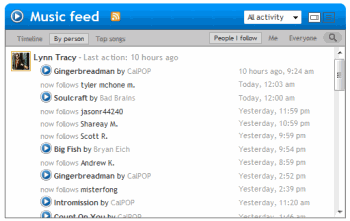Thanks to MP3s and the Internet, we now have millions of songs readily available to us with the click of a button, but, paradoxically, this has often made it even harder to discover new music to listen to. Every online music store and every social network that focuses on online music, however, now features some kind of music recommendation system, and some services like Pandora or Slacker Radio are indeed nothing else but highly sophisticated music discovery engines. In this post, we will look at the different approaches behind some of the most popular music recommendation and discovery services.

Currently, we are seeing four different approaches to giving music recommendations in the market place – though the lines between them are often fluid and some services mash them up in different ways. For the sake of this post, we will only look at a small sample of music recommendation and discovery services that we think are representative of a specific approach.
Pandora: Humans Only
Pandora, one of the most popular music recommendation and discovery services on the Internet today, bases its recommendations on data from the Music Genome Project. The Music Genome Project assigns up to 400 attributes to every song. This, however, has to be done by trained musicians and the process can take up to half an hour per song. While the results of this method are often great, and we ourselves have often discovered interesting new music through Pandora, this approach simply doesn’t scale very well and Pandora’s library can often feel somewhat limited.

Mufin: Algorithms Only
Maybe the best known proponent of a music recommendations system that is purely based on algorithms is Mufin. Mufin’s software analyzes the fundamental properties of a song and makes recommendations based solely on the musical similarity between songs.

While Mufin’s approach generally works surprisingly well, the problem with this technique is that the system is simply oblivious to the cultural context of a song. Thanks to this approach, you might get to hear Christmas songs in February, for example, as the algorithms simply can’t understand the cultural context of your music library.
At times, however, being agnostic to the cultural context of a song can also have its advantages, as Mufin’s recommendations can often help you to rediscover music you had forgotten about. Mufin also works with any song, no matter whether it’s from your own band, Kanye West, or an unsigned local band.
While Mufin’s web service turned out to be a bit of a disappointment, we did like the company’s iTunes plugin, which analyzes the songs in your library.
Lala: Explicit P2P Recommendations
Other services, like Lala, have decided to not feature any real recommendation technology at all. Instead, Lala purely relies on users following each other on the service and recommending new music to each other.

At least for Lala, this approach seems to work very well. When we talked to Lala’s founder and CEO Bill Nguyen last week, he pointed out that 70% of all the music listened to on Lala was new music that was not already in a user’s music locker, and that 18% of new music listened to on the service is bought and added to collections.
eMusic: Hybrid Approach
EMusic, the second largest online music store after iTunes, introduced a new recommendation system on its site late last year. This new system is based on technology from MediaUnbound, one of the larger providers of personalization and recommendation services. MediaUnbound, for example, provides the recommendations for MTV’s Urge, Napster, and Brazil’s Terra Sonora (eMusic, by the way, dropped Choicestream as its recommendation service in favor of MediaUnbound).

As MediaUnbound’s CEO and co-founder Michael Papish explained to us last week, the company believes that a hybrid approach, which uses both algorithms and human input from experts, will provide the best results for users.
For eMusic, this means that the recommendations on the site are constantly fine-tuned by your own actions on the site, MediaUnbound’s algorithms, and eMusic’s editors, which, together with MediaUnbound’s high-level teams, constantly evaluate the resulting sets of recommendations (Papish called this the “mosh pit” approach).
Genius: Apple’s Black Box
It is hard to evaluate how Apple’s Genius feature in iTunes really works, but Apple does have a few advantages. Because iTunes users often rate the songs in their library, Apple gets a lot of explicit information about a song’s popularity. Users also regularly transmit information about how often they played and skipped a song to Apple’s central servers.
Besides this, however, we can only speculate about what Apple looks at to give its recommendations. They surely evaluate playlists and the similarities between different users’ libraries, for example. We can only assume that Apple uses a mashup of various recommendation techniques to come up with its own suggestions.
The results are generally quite good, though often either very predictable or completely random.
Opening the Black Box
In general, a black box approach similar to Apple’s is still common for most recommendation services. Very few services give users a clear insight into why a certain song was recommended and the ability to fine-tune these selections (Pandora is a good example of a service that readily provides this kind of information). We are, however, seeing a trend towards users getting slightly more control over these recommendations. Slacker Radio, for example (see our review of their iPhone app here), lets users choose whether they want to hear more hits or more obscure artists on their radio stations. Mufin, too, gives users some control over how similar the recommended songs should be.
What Does Your Ideal Music Recommendation Engine Sound Like?
In general, we feel that every one of these approaches can provide us with relevant suggestions, depending on what kind of recommendation we are looking for. Of course, sometimes the easiest way to find great songs is to simply forget about the algorithms and editors and just look at what the people around you listen to on a service like imeem.
Do you have a favorite service for music recommendations? Or do you have some recommendations for these services that might help them to improve their service? Just let us know in the comments.
ReadWriteWeb Resources for Recommendation Technologies
We will be profiling other recommendation companies in upcoming posts. We also invite you to explore our custom ReadWriteWeb Resources:
- RWW Recommendation Industry Feed Favorites OPML file (save link)
- RWW Recommendation Industry Feeds – Best of Feed (copy and paste to your reader)
- Click to preview the above feeds before subscribing (pop-up window)
- RWW Recommendation Site Search (Visit and Bookmark)
CC-licensed logo image used courtesy of Flickr user shankar, shiv.










